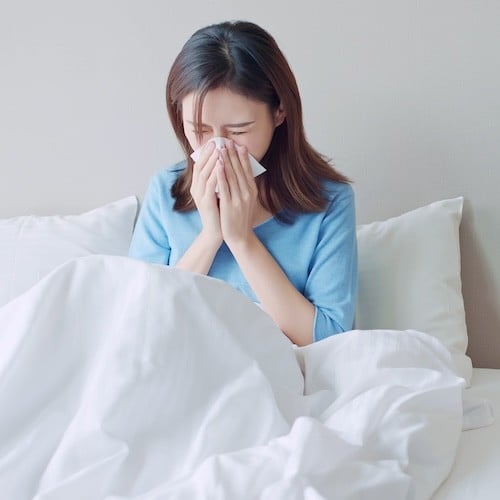Humid and sunny days, sudden and torrential downpours – these are just some of the common weather occurrences Filipinos can encounter on a daily basis. However, these weather conditions can also be a main factor when it comes to the spread of pathogens that cause cough and colds.
These particular health issues are common among Filipinos and tend to peak at certain times of the year. The question is: are you more prone to getting sick when it is sunny or rainy? To answer this question, learn more about peak cough and cold season in the Philippines so you can prepare for it adequately.
When Do Cough and Colds Run Rampant?
In the Philippines, coughs and colds can be prevalent during the months of June to November, considered to be the country’s rainy season as well as “flu season.”
Cases tend to rise during this timeframe because of fluctuating temperatures (cold to hot and vice versa) that may affect body temperatures. Rainy days are said to bring colder temperatures that may lead to weakened immune systems. When your body’s defenses are not at their best, your chances of getting sick increase.
However, just because flu season happens during the mentioned months, it does not mean that your risk for coughs and colds becomes nonexistent. It is possible that the pathogens responsible for either coughs or cold can affect people during the other months of the year and negatively impact health.
With these in mind, it is safe to say that you should never let your guard down. Here are some ways to help you prevent the onset of coughs and colds.
3 Ways to Reduce Your Cough and Cold Risk
Avoiding cough and colds starts with preparing your body’s defenses against the viruses and bacteria that can cause them. Health experts have unanimously agreed that a strong immune system is one of the best ways to prevent illnesses. Here are some ways to lower your chances of having cough and colds:
- Drink lots of water: Staying hydrated can have its perks especially when you are already sick since it can thin out mucus and let them move more “freely” so they can be eliminated from your body. Increasing your fluid intake may also aid with body temperature regulation, improved organ function, and better sleep quality.
- Take an immune-boosting supplement: While these are not meant to be substitutes for a healthy diet and lifestyle, immune-boosting supplements may provide a much-needed assist. Oftentimes, nutrients found in supplements may help strengthen your body’s immune system and provide additional benefits too.
- Wash your hands properly: This habit can lower your chances of getting coughs and colds as it can target germs, viruses, or bacteria that may already be on your hands. Plus, it also prevents the spread of these particular pathogens from one person to another.
Ideally, wash your hands with soap and water for 20 seconds (the equivalent of singing one “Happy Birthday” song). If you are on the go and do not have immediate access to soap and water, bring an alcohol-based sanitizer with at least 60% alcohol.
What Should You Do If You Get Cough and Colds?
If you are already dealing with cough and colds, take additional measures to prevent the spread of pathogens. When you cough or sneeze, cover your mouth and nose with a tissue or your hand (provided that you wash it immediately after).
Moreover, stay at home and away from people, especially. Close contact with other people when you are sick can cause the spread of disease-causing germs. If this is unavoidable though, wear a well-fitting face mask that covers your nose and mouth. By now, you are aware that this simple act can help protect the lives of other people as it helps prevent transmission of germs, viruses, and bacteria to other people.
Lastly, make sure you have some cough and cold medicines ready just in case you feel unwell. Talk to your doctor about the medicines that are best suited for your current condition.
If symptoms still persist, consult your doctor or seek medical attention. Some health issues can manifest through symptoms like cough and colds, and indicating that something is wrong with your body.
References:
https://www.makatimed.net.ph/blogs/9-natural-remedies-for-colds-and-flu-symptoms/
https://www.visitcompletecare.com/blog/can-you-get-sick-from-being-in-the-rain/
https://www.cdc.gov/hygiene/personal-hygiene/coughing-sneezing.html
https://www.cdc.gov/handwashing/when-how-handwashing.html
https://www.cdc.gov/handwashing/show-me-the-science-hand-sanitizer.html
https://www.cdc.gov/antibiotic-use/colds.html
https://www.cdc.gov/features/rhinoviruses/index.html
https://www.webmd.com/cold-and-flu/what-makes-colds-worse
https://www.hsph.harvard.edu/nutritionsource/vitamin-c/
https://www.sfcdcp.org/communicable-disease/healthy-habits/how-to-put-on-and-remove-a-face-mask
https://health.clevelandclinic.org/eat-these-foods-to-boost-your-immune-system/
https://www.healthline.com/nutrition/immune-boosting-supplements https://www.mayoclinic.org/diseases-conditions/flu/symptoms-causes/syc-20351719








